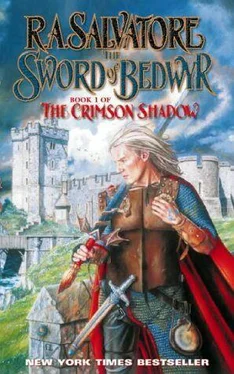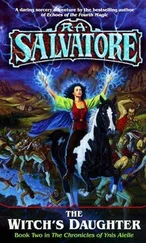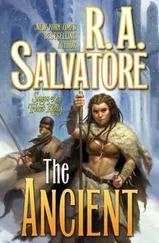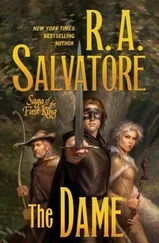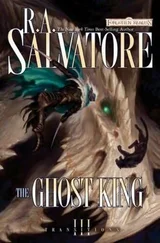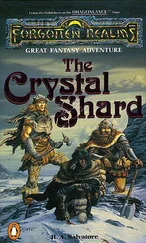Oliver was indeed worried, fearful that this whole “Crimson Shadow” business was quickly getting out of control. It did not bother the halfling to hear the populace speaking out against the tyrannies of Morkney and his pompous merchant class—those wretches had it coming, the halfling figured. But Oliver did harbor a thief’s worst fear: that he and Luthien were attracting too much unwanted attention from powerful adversaries. The halfling loved being the center of attention, oftentimes went out of his way to be the center of attention, but there were reasonable limits.
Luthien caught up to him quickly. “Have you planned an excursion into the upper section this night?” the young man asked, and it was plain from his tone that he hoped Oliver had not.
The halfling turned his gaze upon Luthien and cocked an eyebrow as if to mock the question. They had not pulled any jobs since springing Shuglin, and Oliver had explained that they likely wouldn’t go into the upper section again for at least a month. He knew why Luthien was asking, though.
“You have plans,” he stated as much as asked. Oliver could guess the answer readily enough. Luthien was ready for another tryst with Siobhan.
“I will meet with the Cutters,” Luthien answered, “to check on Shuglin and his companion.”
“The dwarves fare well,” Oliver said. “Elves and dwarves get on well, since they share persecution at the hands of the humans.”
“I just want to check,” Luthien remarked.
“Of course,” Oliver said with a wry smile. “But perhaps you should come this night back to the apartment. The air is chill and the Dwelf will likely see trouble before the moon is set.”
The deflated look that washed over Luthien nearly pulled a burst of laughter from Oliver’s serious expression. Oliver didn’t harbor any intentions of keeping Luthien from his meeting, he just wanted to make the young man squirm a bit. In the halfling’s view, love should never be an easy thing: sweeter tasting is the forbidden fruit.
“Very well,” the halfling said after a long and uncomfortable moment. “But do not be out too late!”
Luthien was off and running, and Oliver did chuckle. He smiled all the way back to the apartment, his worries brushed aside by his romantic nature.
Candles burned long into the night in the private chambers of Duke Morkney’s palace. A group of merchants had demanded an audience, and the duke, so busy with the approaching end of the trading season, could find no time to accommodate them earlier in the day.
Morkney could easily guess the topic of this meeting—all of Montfort was buzzing about the break at the mines. Morkney was not so concerned with the news—this wasn’t the first time a prisoner had escaped, after all, and it wouldn’t likely be the last. But these merchants, standing before the duke’s fabulous desk, their grim features set with worry, obviously were more than a little concerned.
The duke sat back in his chair and listened attentively as the merchants complained and whined, their stories always connected to this mysterious Crimson Shadow figure.
“They’re painting red shadows all over my store!” one man grumbled.
“And mine,” two others said at the same time.
“And nearly every street in Montfort bears the words ‘The Shadow Lives!’” offered another.
Morkney nodded his understanding; he, too, had seen the annoying graffiti. He understood, too, that this Crimson Shadow wasn’t doing the painting. Rather, others were taking up the call of this mysterious figurehead; and that, Morkney was wise enough to realize, was more dangerous indeed.
He listened to the rambling merchants for another hour, politely, though he heard the same stories over and over again. He promised to take the matter under serious consideration, but secretly, Morkney was hoping that this minor annoyance would simply go away.
King Greensparrow was complaining again about the size of Montfort’s tithe, and by all the words of the local seers, the winter would be a cold one.
And so the duke of Montfort was more than a little relieved when the captain of his Praetorian Guard interrupted his breakfast the next morning to inform him that the wagon caravan which had set out for Avon—the caravan carrying the four men who had been sentenced the same day as the dwarf, Shuglin—had been attacked on the road.
The captain of the guard produced a tattered red cloak, its material taking on the darker hue of dried blood in many places.
“We got the bloke,” the cyclopian said. “No more Crimson Shadow. And we got the halfling ’twas said to be traveling in the shadow’s shadow! And seven others”—he held up six fingers—“that were with them.”
“And the caravan?”
“On its merry way,” the cyclopian replied happily. “I lost four, but we got two more prisoners now, and the Crimson Shadow and the halfling’re dead and dragging by ropes behind.”
Morkney took the torn cloak and promised the soldier that he and his troops would be properly rewarded, then dismissed the cyclopian and found that his breakfast suddenly tasted better.
Later, though, on a sudden discomforting hunch, Morkney took the torn cloak into his private study. He searched his library for a specific tome, then fumbled through his desk drawers to find the proper components for a spell. The Crimson Shadow had left telltale signs behind him on his thieving adventures, silhouettes magically created against walls and windows, and by Morkney’s reasoning, this cloak was likely the source.
The duke sprinkled exotic herbs and powders over the tattered cloth and read the enchantment from his book. The components eerily glowed a silvery blue hue, then went dark.
Morkney waited quietly for another minute, then another. Nothing happened. The bloodstained cloak was not magical and had never been enchanted.
Like the vandals painting walls throughout the city, this attempted raid had not been the handiwork of the real Crimson Shadow, but rather the lame attempt of an upstart glory-seeker.
Duke Morkney settled back into a large chair and put his old and shaky hand up to his chin. The Crimson Shadow was fast becoming a real problem.
The Dwelf was subdued that day and that night, sobered by news that a halfling named Stumpy Corsetbuster and a human rogue by the name of Dirty Abner had been killed out on the road east of Montfort. The Crimson Shadow was dead, said the rumors—rumors that Oliver deBurrows did not seem so unhappy to hear when he entered the tavern to join Luthien sometime after sundown.
“Yep, the Crimson Shadow’s no more, so it’s said,” Tasman remarked to them, filling their mugs.
It occurred to Luthien that the barkeep’s expression was not in accord with the gravity of his words. And how long had it been, Luthien wondered, since Tasman had asked him or Oliver for any payment? Or were free drinks a benefit of renting an apartment from the barkeep?
Tasman walked away to see to another customer, but he let his stare—his knowing stare, Luthien realized—linger long on the young man and the halfling sitting beside him.
“A pity about Stumpy,” Oliver remarked. “A fine halfling-type, with a fine fat belly.” As with Tasman, though, Luthien didn’t think Oliver’s emotions agreed with his words.
“You’re not bothered by this,” the young man accused. “Some men—and your fine halfling-type—are dead.”
“Thieves are killed every day in Montfort’s streets,” Oliver remarked, and he looked directly into Luthien’s cinnamon-colored eyes. “We have to consider the benefits.”
“Benefits?” Luthien nearly choked on the word.
“Our money will not last the winter,” Oliver explained. “And I do not like the prospects of wandering the open road with so cold snowflakes coming down around me.”
Читать дальше
